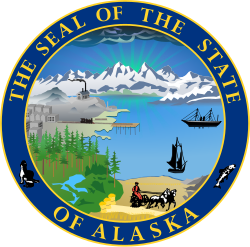November 2, 2004 | |||||||||||||||||
| |||||||||||||||||
 Results by borough and census area Murkowski: 40–50% 50–60% 60–70% 70–80% Knowles: 40–50% 50–60% 60–70% 70–80% | |||||||||||||||||
| |||||||||||||||||
| Elections in Alaska |
|---|
 |
The 2004 United States Senate election in Alaska was held on Tuesday November 2, Republican candidate and Interim United States senator Lisa Murkowski won re-election to a full term in office by defeating former governor of Alaska Tony Knowles. Murkowski had been appointed in 2002 by Frank Murkowski, her father and the governor of Alaska.
Contents
- Background
- Republican primary
- Candidates
- Results
- Democratic primary
- Candidates 2
- Results 2
- General election
- Candidates 3
- Campaign
- Debates
- Predictions
- Polling
- Results 3
- See also
- Notes
- References
At the time, this was the closest United States Senate election in Alaska history; it has since been surpassed in 2008, 2010 and 2014. Murkowski was the first woman elected to the United States Congress from Alaska. As of 2025, Murkowski’s total vote of 149,773 remains the most she has received in her four campaigns for United States Senate.

